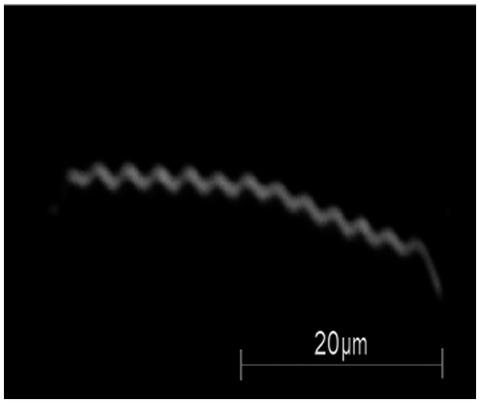当前位置:
X-MOL 学术
›
Mol. Oral Microbiol.
›
论文详情
Our official English website, www.x-mol.net, welcomes your
feedback! (Note: you will need to create a separate account there.)
Development of an FhbB based chimeric vaccinogen that elicits antibodies that block Factor H binding and cleavage by the periopathogen Treponema denticola
Molecular Oral Microbiology ( IF 2.8 ) Pub Date : 2020-11-20 , DOI: 10.1111/omi.12325 Nathaniel S. O'Bier 1 , Dhara T. Patel 1 , Lee D. Oliver 1 , Daniel P. Miller 1 , Richard T. Marconi 1
Molecular Oral Microbiology ( IF 2.8 ) Pub Date : 2020-11-20 , DOI: 10.1111/omi.12325 Nathaniel S. O'Bier 1 , Dhara T. Patel 1 , Lee D. Oliver 1 , Daniel P. Miller 1 , Richard T. Marconi 1
Affiliation

|
Treponema denticola is a proteolytic anaerobic spirochete and key contributor to periodontal disease of microbial etiology. As periodontal disease develops and progresses, T. denticola thrives in the hostile environment of the subgingival crevice by exploiting the negative regulatory activity of the complement protein, factor H (FH). FH bound to the cell surface receptor, FhbB (FH binding protein B), is competent to serve as a cofactor for the Factor I mediated‐cleavage of the opsonin C3b. However, bound FH is ultimately cleaved by the T. denticola protease, dentilisin. As the T. denticola population expands, the rate of FH cleavage may exceed its rate of replenishment leading to local FH depletion and immune dysregulation culminating in tissue and ligament destruction and tooth loss. The goal of this study was to develop a T. denticola FhbB based‐vaccine antigen that can block FH binding and cleavage and kill cells via antibody‐mediated bactericidal activity. Tetra (FhbB‐ch4) and pentavalent fhbB (FhbB‐ch5) chimerics were engineered to have attenuated FH binding ability. The chimerics were immunogenic and elicited high‐titer bactericidal and agglutinating antibody. Anti‐Fhb‐ch4 antisera blocked FH binding and cleavage by the T. denticola protease, dentilisin, in a dose dependent manner. Precedent for the use of FH binding proteins comes from the successful development of two FDA approved vaccines for type B Neiserria meningitidis. This study is the first to extend this approach to the development of a preventive or therapeutic vaccine (or monoclonal Ab) for periodontal disease.
中文翻译:

基于FhbB的嵌合疫苗原的开发,该抗体引发抗体,这些抗体可通过致病性病原性密螺旋体(Trenponema denticola)阻断因子H的结合和裂解
密闭螺旋体是蛋白水解厌氧螺旋体,是微生物病因牙周疾病的关键因素。随着牙周疾病的发展和进展,通过利用补体蛋白H因子(FH)的负调节活性,T。denticola在龈下缝隙的不利环境中environment壮成长。与细胞表面受体FhBB(FH结合蛋白B)结合的FH可以充当辅因子I介导的调理素C3b裂解的辅因子。但是,结合的FH最终被T. denticola蛋白酶dentilisin切割。作为T. denticola随着人口的增长,FH裂解的速度可能超过其补充速度,从而导致局部FH消耗和免疫失调,最终导致组织和韧带破坏以及牙齿脱落。这项研究的目的是开发一种基于T. denticola FhbB的疫苗抗原,该抗体可通过抗体介导的杀菌活性来阻止FH结合和裂解并杀死细胞。Tetra(FhbB-ch4)和五价fhbB(FhbB-ch5)嵌合体经过改造,具有减弱的FH结合能力。嵌合体具有免疫原性,并引发了高滴度的杀菌和凝集抗体。抗Fhb-ch4抗血清阻止FH结合并被T. denticola切割蛋白酶,牙本质素,呈剂量依赖性。使用FH结合蛋白的先例是成功开发了两种FDA批准的B型脑膜炎奈瑟氏菌疫苗。这项研究是首次将这种方法扩展到牙周疾病预防或治疗疫苗(或单克隆抗体)的开发。
更新日期:2020-11-20
中文翻译:

基于FhbB的嵌合疫苗原的开发,该抗体引发抗体,这些抗体可通过致病性病原性密螺旋体(Trenponema denticola)阻断因子H的结合和裂解
密闭螺旋体是蛋白水解厌氧螺旋体,是微生物病因牙周疾病的关键因素。随着牙周疾病的发展和进展,通过利用补体蛋白H因子(FH)的负调节活性,T。denticola在龈下缝隙的不利环境中environment壮成长。与细胞表面受体FhBB(FH结合蛋白B)结合的FH可以充当辅因子I介导的调理素C3b裂解的辅因子。但是,结合的FH最终被T. denticola蛋白酶dentilisin切割。作为T. denticola随着人口的增长,FH裂解的速度可能超过其补充速度,从而导致局部FH消耗和免疫失调,最终导致组织和韧带破坏以及牙齿脱落。这项研究的目的是开发一种基于T. denticola FhbB的疫苗抗原,该抗体可通过抗体介导的杀菌活性来阻止FH结合和裂解并杀死细胞。Tetra(FhbB-ch4)和五价fhbB(FhbB-ch5)嵌合体经过改造,具有减弱的FH结合能力。嵌合体具有免疫原性,并引发了高滴度的杀菌和凝集抗体。抗Fhb-ch4抗血清阻止FH结合并被T. denticola切割蛋白酶,牙本质素,呈剂量依赖性。使用FH结合蛋白的先例是成功开发了两种FDA批准的B型脑膜炎奈瑟氏菌疫苗。这项研究是首次将这种方法扩展到牙周疾病预防或治疗疫苗(或单克隆抗体)的开发。











































 京公网安备 11010802027423号
京公网安备 11010802027423号